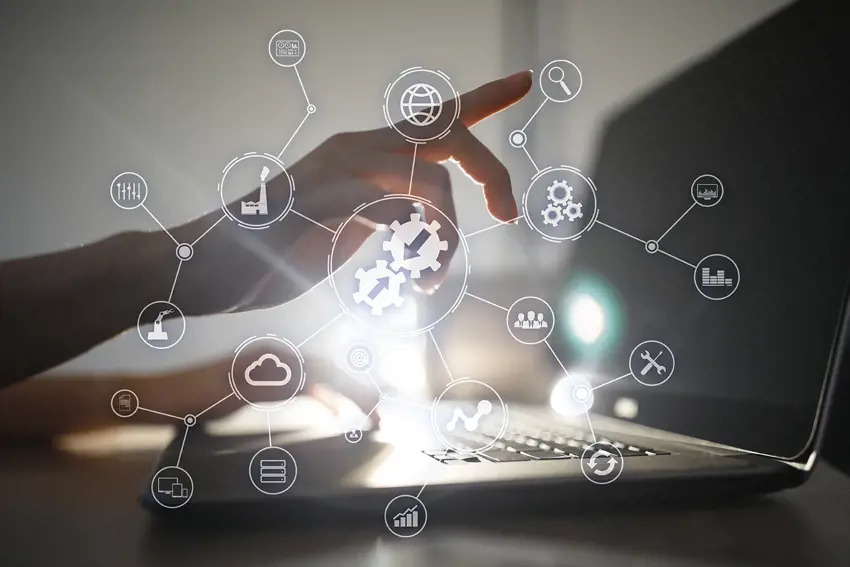What’s New in Business Central 2025 Release Wave 2
The Autumn brings the second major release of the year for Business Central, as part of the 2 wave annual update cycle. Here we look at the highlight features.
Legacy ERP systems and their customised functionality are preventing many businesses from upgrading to modern solutions. However, upgrading to modern ERP systems can be the key to unlocking increased efficiency, flexibility and security.

Legacy ERPs, while once valuable, can hinder business growth due to outdated technology and compatibility issues. Modern ERP solutions, on the other hand, offer dynamic features that support streamlined operations and innovation. These systems are designed to futureproof your business, ensuring you can adapt to evolving market demands with ease.
Jumping on board with a new ERP system doesn't have to be overwhelming. By understanding the ERP upgrade process and recognising the advantages of modern systems, you can make strategic decisions that contribute to long-term success. This article will guide you through assessing your current system and exploring cutting-edge solutions that best fit your business needs.
Using legacy systems can affect your business in several ways. Key issues are usually outdated technology, increased costs and limited integration. Addressing these issues can help you maintain efficiency and security in your business operations.
Legacy ERP software often lacks real-time data capabilities. With outdated technologies, making informed decisions becomes difficult, leading to potential risks and inefficiencies in your business processes. You might find that the limited functionality of these systems can't meet your evolving business requirements. Moreover, security risks increase as these aged systems may not receive regular updates, leaving your data vulnerable to breaches or attacks.
Errors are more common with old systems. These systems may not support new technologies, making them unreliable and prone to failures. This can lead to bottlenecks in productivity that affect your bottom line. By relying on outdated ERP software, you'll likely face challenges that could hinder your organisation’s growth and adaptability.
The cost of maintaining legacy software doesn’t stop at the initial investment. Ongoing software maintenance can be expensive as it requires specialised skills, which may be scarce. Over time, these indirect costs add up, impacting your budget.
While upfront costs for upgrading may seem high, sticking with legacy systems might lead to increased long-term expenses. Indirect costs like decreased productivity and potential security breaches can further strain resources. As technology advances, the gap widens, making it difficult for your company to catch up in the future, potentially affecting your competitiveness.
Legacy systems often face integration complexities that can disrupt business processes. They likely won't support seamless integration with new software, leading to isolated data and inefficiencies in operation. This makes it hard to have a cohesive overview of your business activities.
Moreover, mobile access is typically limited with older systems. Today's business environment demands flexibility and mobility, both of which help with informed decision-making on the go. Without the ability to swiftly access information, your business may lag behind competitors. Integration issues and mobility limitations, therefore, are significant drawbacks when relying on legacy systems.

Modern ERP systems offer significant benefits by utilising cutting-edge technologies. They enable seamless integration with various business process applications and enhance overall performance through improved security measures and compliance standards.
The best modern ERP leverages cloud-based solutions that transform how businesses operate. With cloud ERP, you can access data from anywhere, enhancing collaboration. Cloud providers carry out regular updates, keeping your system up-to-date with minimal downtime. This scalability allows your system to grow with your business while delivering a reliable service.
Cloud systems offer seamless integration with existing systems, reducing the complexity often associated with legacy systems. Moreover, cloud solutions reduce upfront costs as they typically follow a subscription model, eliminating the need for expensive hardware investments.
Modern ERP solutions enhance business agility and performance. They handle real-time insights, helping you make informed decisions quickly. This agility is essential in today's dynamic business landscape, allowing you to adapt swiftly to changing market conditions.
With features like automated workflows and advanced analytics, these systems streamline operations and boost productivity. These modern business solutions offer seamless integration across departments and easy, but role-restricted, access to key data.
Security in modern ERP systems is often world-class, thanks to the resources available to leading cloud providers like Microsoft. Cloud-based ERP systems incorporate robust security protocols to protect sensitive data. These include encryption, multi-factor authentication and regular security audits. You can feel confident that your data is secure with the latest security technology.
Moreover, these systems ease the burden of meeting regulatory requirements. Regular updates ensure that your ERP system adheres to the latest compliance standards, reducing the risk of violations. By addressing both security and compliance, modern ERP systems provide a reliable foundation for your operations.
Upgrading to a modern ERP system involves a detailed strategy and careful decision-making. Key aspects include planning your migration, selecting the right ERP solution that aligns with your business needs and ensuring that the transition is seamless to avoid disruptions in your business activities.
Strategic planning is essential for a successful ERP migration. Start by analysing your current business processes and identifying areas for improvement. This step helps define what you need in a new system.
Involve stakeholders from various departments like human resources and customer relationship management to gain insights into their specific needs. Create a project plan that includes timelines, resource allocation and potential risks. A clear plan paves the way for a smooth migration process, ensuring that the business operations run seamlessly during the transition.
An implementation partner like Dynamics Consultants can help you plan your ERP migration effectively, ensuring no stone is unturned when it comes to meeting your business requirements.

Choosing the ideal ERP system involves evaluating several key factors. Look for a solution with a modern user interface that is intuitive and user-friendly.
Review the functionality related to business applications, such as finance, supply chain and CRM. It's important to select an ERP that uses compatible programming languages and integrates well with your current systems. This approach ensures the system enhances efficiency and supports strategic initiatives.
Many businesses are still using legacy ERP systems because they've been customised to meet their exact needs, but this presents more difficulties when upgrading. With solutions like Dynamics 365 Business Central, you get access to ready-made modules that meet highly specific business needs in warehousing, supply chain management and much more.
A smooth transition to a new ERP system involves coordination and communication. Work with an experienced implementation partner like Dynamics Consultants who understands the intricacies of the upgrade process. This can significantly reduce the implementation effort required.
Training your staff on these modern tools ensures you receive their buy-in and that they are confident and proficient. Often, one of the biggest barriers to implementing modern tech is resistance from employees who worry about learning new systems. Regular feedback from the team can help in adjusting processes as needed. Ensuring a smooth transition not only improves adoption rates but also minimises disruptions to business operations.
Enhancing your business operations with modern software can make a significant difference. Embracing artificial intelligence and machine learning can provide valuable insights, while regular software updates ensure future viability and robustness in business intelligence.
Utilising artificial intelligence (AI) and machine learning (ML) in your ERP system offers a competitive edge. These technologies can analyse vast amounts of data quickly, providing you with valuable insights into your business operations. For example, modern ERP solutions like Microsoft Dynamics 365 use AI to enhance efficiency and profitability. By incorporating machine learning, your system can predict trends, optimise processes and help with decision-making, ensuring you're well-prepared for future challenges.
AI can automate routine tasks, freeing up employee time for more strategic work. This not only speeds up operations but also reduces human error. Business leaders can rely on robust business intelligence from these technologies to guide strategic decisions, making your company more agile and responsive.

Regular software updates keep your ERP system at peak performance. Software providers like Microsoft regularly release updates that introduce new features, fix bugs and enhance security. These updates maintain future viability and ensure your system meets current business demands and are applied automatically. These regular updates keep your technology aligned with industry standards.
Software providers and their accredited partners offer assistance and guidance, ensuring your software solutions are tailored to your evolving needs. This ongoing relationship helps you continually improve your operations, ensuring your business stays competitive and efficient over time. Regular updates mean your ERP can adapt to changes, offering lasting solutions for your business growth.
Thinking about moving from a legacy ERP system to a modern solution involves considering many factors, such as the reasons for upgrading, the integration process, costs, scalability, challenges and planning steps.
Many companies switch to modern ERP systems due to the need for better integration with tools like CRM and e-commerce platforms. Legacy systems often can't handle these modern requirements efficiently, prompting a move to better technology that supports business growth and innovation. Security and a lack of visibility are other key reasons why businesses are leaving their legacy ERP systems behind.

Modern ERP systems are typically designed for easier integration with other technologies. They often use APIs and have cloud-based functionalities that make them more flexible. This contrasts with legacy systems, which may struggle to connect with new software, delaying updates and innovation.
The cost of transitioning to a modern ERP system can vary. Initial expenses might include software licences, implementation and training. However, modern systems can lead to cost-savings with improved efficiency. Resource allocation often involves dedicating technology and people to manage the change process effectively.
Modern ERP solutions are designed to scale with your business. They offer features that can grow as your company expands. Unlike legacy systems, which might require complete overhauls for large changes, modern ERPs adjust more smoothly, allowing you to add users or features with minimal disruption. Additionally, they offer you real-time visibility of data, which many legacy ERP systems aren't capable of.
Upgrading an ERP system may pose several challenges, such as data migration, user resistance and potential downtime. You should ensure compatibility with existing processes and technologies and address employee training to manage these changes effectively.
To ensure a smooth ERP upgrade, start by assessing your current system and define clear objectives for the new one. Engage stakeholders early, choose a reliable partner and develop a detailed project plan. Continuous training and support throughout the process can also help maintain momentum and efficiency.
The Autumn brings the second major release of the year for Business Central, as part of the 2 wave annual update cycle. Here we look at the highlight features.
After a recent visit to the Digital Manufacturing 2day event in Coventry and an insightful presentation by Lord Chris Holmes, I thought I would delve a bit deeper into the current AI regulation facing UK industry.
Choosing the right ERP system when moving on from Sage 50 can shape how efficiently your business grows and adapts. If you want advanced features, greater flexibility and easier integration with familiar Microsoft tools, Microsoft Dynamics 365 Business Central is often the stronger option compared to Sage 200. As real-time data insight, automation and scalability are now necessities and not luxuries, your ERP upgrade decision is more important than ever.